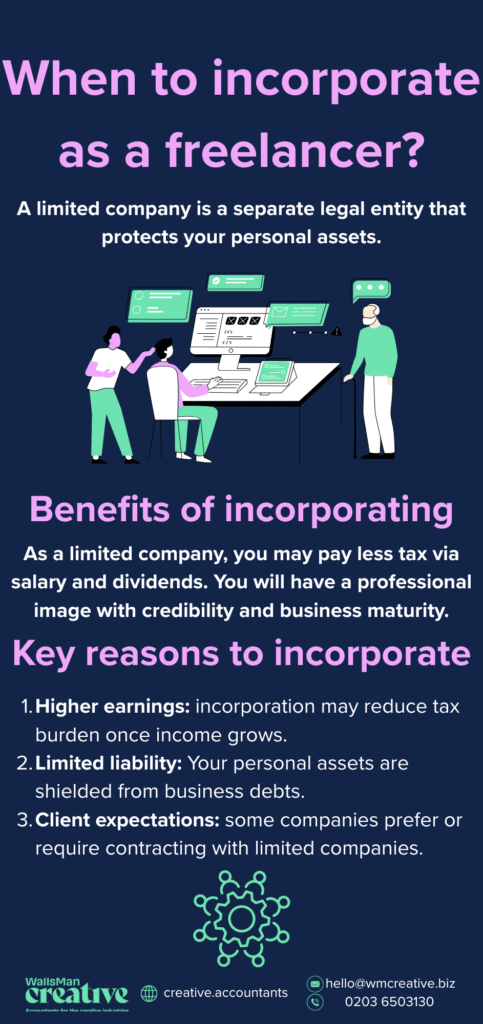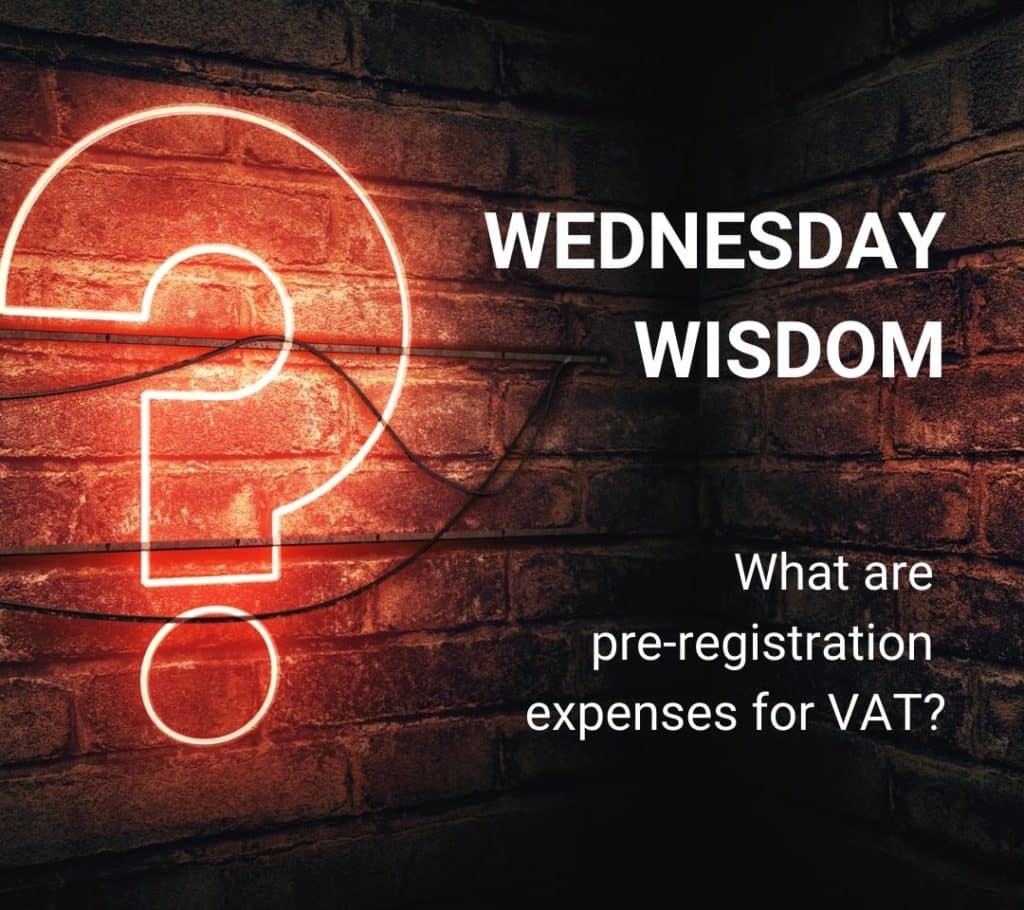More freelancers in the UK are asking the same question: Is it time to incorporate?
It’s a fair one. Working for yourself has never been more common, but deciding when to take the next step, also known as registering a limited company, isn’t always clear.
Incorporation is the name given to the creation of a corporate entity, or new limited company, that is separate from an individual (sole-trader). The business is then separate from the person who owns or manages it and become a legal entity in its own right.
So, when should a freelancer incorporate? Three of the most common reasons are:
- You’re earning enough to justify the move
- You want to limit personal liability
- Clients expect a limited company
Let’s get into more details!
Creative Takeaways
- Sole trader vs Ltd – Know the legal differences.
- Limited liability – Protects your personal assets.
- Admin duties – More filing and rules.
- Business bank account – Required for Ltd structure.
- Get advice – Speak to a creative-focused accountant.
Table of contents
1. What does it mean to incorporate as a freelancer?
Incorporation means setting up your freelance business as a limited company, opposed to operating as a sole trader.
What’s the difference between a sole trader and a limited company?
As a sole trader, you and your business are the same legal entity.
You keep all your profits (after tax), but you’re also personally responsible for any debts or legal issues. It’s simple to set up and requires less paperwork. Many freelancers start this way.
When you register a limited company, your business becomes a separate legal structure. You’re no longer “you doing business”. You’re a director of a company that you own and run.
The company earns the money, pays the expenses, and then pays you.
This setup affects how you pay tax, how much financial risk you carry, and how clients see you. It’s one of the most common freelancer legal structures once a business grows past a certain point.
To incorporate, you’ll need to register your company with Companies House. The Companies House is the UK’s official register of companies. You’ll also need to follow certain rules: filing annual accounts and keeping business records.
Incorporation is a more formal business setup. It brings extra responsibilities, but it also offers more protection, flexibility, and in many cases, tax advantages.
2. When should a freelancer incorporate?
So, you are working away as a freelancer, declaring your income as a sole trader.
Nice and simple: your money comes in, your expenses go out and you pay tax and national insurance on the profits.
Now, someone is telling you about this great idea of setting up as a limited company, but don’t know when is the right time to move over from operating as a sole trader, right?
Well, don’t worry – you aren’t the only one!
And relax, there is no set formula for incorporation so you haven’t missed the boat at all.

Due to the additional costs of operating via a Limited Company (extra accountancy fees, for example), we generally say that someone should start looking at their position when their taxable profits are in the region of £35,000 – £50,000.
It is at this stage that the tax efficiencies (lower rates of corporation tax and dividend tax) start to outweigh the additional administrative costs that you will be faced.
However, tax isn’t everything.
There are other elements that need to be considered when you are thinking of operating via a Limited Company.
Two such examples are:
- Limited liability – your liability is generally restricted to the capital you initially invest into the Company.
- Increased respectability – some firms only like working with other Ltd’s.
Given the above, the magic figure of £40,000 may not work for everyone and you will need to consider your individual circumstances.
Having said that, looking at the figures, if you are approaching profits of £40,000 for your sole trader business on an annual basis, incorporation is definitely something to consider.
| Creative Tip Your sole trader accounts and tax return are not that simple – for example, you need to make sure you are claiming all of the correct expenses to: • maximises your tax savings and • ensure that you are not claiming for non-tax deductible expenses |
3. Benefits of incorporating (and why they matter to creatives)
You reached the magical income, and you’re evaluating your options. Once you set up a limited company, you will have some practical advantages:
- Limited liability: Your personal assets are protected if something goes wrong in the business. The company is a separate legal entity.
- Tax flexibility: You can split income between salary and dividends, which often results in lower overall tax. Profits are taxed at the corporation tax rate.
- Professional image: Being a registered company can make you appear more established to clients.
- Access to funding: Some grant funding for creative businesses is only open to limited companies. It can also make loan applications or investment discussions easier.
These are all the benefits of incorporating, but of course, there are other things to consider before you incorporate.
4. Things to consider before you incorporate
Incorporating comes with more responsibility. And before you register a limited company, you have to be aware of these extra steps.
- More admin: Running a company means more paperwork. You’ll need to file annual accounts, submit a Company Tax Return, and stay on top of deadlines from Companies House and HMRC. If you hire anyone (even just yourself), you’ll also deal with PAYE.
- Public records: When you incorporate, your company details become public. That includes your registered office address and a summary of your finances.
- Setup and running costs: Incorporating is cheap, but keeping a company compliant costs time and money. You may need software, support, or professional services to stay organised.
- Separate business bank account – You’ll need a dedicated account for the company. This helps keep finances clean, but it’s one more thing to manage.
- Professional support matters – Having a good accountant is strongly recommended. They’ll help you structure things properly, meet deadlines, and avoid costly mistakes. This is especially important if you have irregular income or multiple income streams.
Incorporating isn’t difficult — but it’s not passive. If you’re not ready to manage these extra steps, it may be better to wait.
5. Need advice? Hire an accountant!
There’s no single right answer on when should a freelancer incorporate. It all depends on how much you earn, your future plans, and how comfortable you are with some extra admin.
For freelancers and creatives, income often isn’t predictable. You might have a strong year followed by a quiet one. That makes timing especially important. The tax benefits of a limited company only make sense if the structure suits your earnings and how you work.
That’s why it’s worth speaking to an accountant before making the move.
We specialise in helping UK creatives decide when and how to incorporate. Whether you’re an artist, content creator, designer, or filmmaker, we can look at your income, goals, and setup, then give you straight advice.
Book a free consultation today and get clear on your next step!




